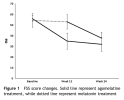rapidboson
Senior Member (Voting Rights)
Chronic Fatigue Syndrome (CFS) represents a disabling condition characterized by persistent mental and physical fatigue, bodily discomfort and cognitive difficulties.
To date the neural bases of CFS are poorly understood; however, mono-aminergic abnormalities, sleep–wake cycle changes and prefrontal dysfunctions are all thought to play a role in the development and maintenance of this condition.
Here we explored in a group of 62 CFS subjects the impact on fatigue levels of agomelatine, an antidepressant with agonist activity at melatonin receptors (MT1 and MT2) and antagonist activity at serotoninergic 2C receptors (5HT2C). To tease out the relative effects of MT-agonism and 5HT2C antagonism on fatigue, we compared agomelatine 50 mg u.i.d. with sustained release melatonin 10 mg u.i.d. in the first 12-week-long phase of the study, and then switched all melatonin-treated subjects to agomelatine in the second 12-week-long phase of the study.
Agomelatine treatment, but not melatonin, was associated with a significant reduction of perceived fatigue and an increase in perceived quality of life. Moreover the switch from melatonin to agomelatine was associated with a reduction of fatigue levels. Agomelatine was well tolerated by all enrolled subjects.
Our data, albeit preliminary, suggest that agomelatine treatment could represent a novel useful approach to the clinical care of subjects with CFS.
LINK
To date the neural bases of CFS are poorly understood; however, mono-aminergic abnormalities, sleep–wake cycle changes and prefrontal dysfunctions are all thought to play a role in the development and maintenance of this condition.
Here we explored in a group of 62 CFS subjects the impact on fatigue levels of agomelatine, an antidepressant with agonist activity at melatonin receptors (MT1 and MT2) and antagonist activity at serotoninergic 2C receptors (5HT2C). To tease out the relative effects of MT-agonism and 5HT2C antagonism on fatigue, we compared agomelatine 50 mg u.i.d. with sustained release melatonin 10 mg u.i.d. in the first 12-week-long phase of the study, and then switched all melatonin-treated subjects to agomelatine in the second 12-week-long phase of the study.
Agomelatine treatment, but not melatonin, was associated with a significant reduction of perceived fatigue and an increase in perceived quality of life. Moreover the switch from melatonin to agomelatine was associated with a reduction of fatigue levels. Agomelatine was well tolerated by all enrolled subjects.
Our data, albeit preliminary, suggest that agomelatine treatment could represent a novel useful approach to the clinical care of subjects with CFS.
LINK

